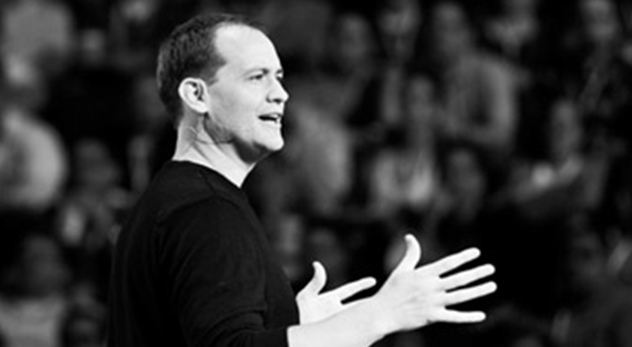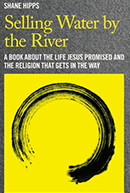
Author Shane Hipps talks about faith, fulfillment and the danger of religion. – Image courtesy of Mars Hill
Shane Hipps recently served as the Teaching Pastor at Mars Hill in Grand Rapids, Michigan (no relation to Mark Driscoll’s church by the same name in Seattle). His current passion is to be a catalyst in people’s movement towards God, which he does through teaching, speaking and writing. Hipps, 38, is the author of Selling Water by the River: A Book About the Life Jesus Promised and the Religion that Gets in the Way. Here, we discuss the gift of eternal life and how he believes we can find fulfillment in Christ.
RNS: You were teaching pastor at Mars Hill Church in Grand Rapids. What are you doing these days?
SH: I’m continuing to write and speak. I’m also doing leadership development work with corporate executives these days.
RNS: Just about anything can be a substitute for God–work, sex, money–even religion as you point out in your book. Is it that finding fulfillment in Christ is much harder than these more accessible or tangible things? If the life he promised is so fulfilling, why aren’t we all living it?
SH: The first commandment in the Bible says “you shall have no other gods before me.” God adds the phrase “before me.” It is a fascinating acknowledgment by the one and only God that there may in fact be other gods. I don’t think God was thinking only of statues and mythical figures. Anything can become a god – our relationships, work, bodies, dreams, etc. All these things fight for primacy, but God says, “first things first.”
The reason for this isn’t to prop up God’s sense of self. The directive is for our sake. Think of it as a matter of ones and zeros. Everything in our life is a zero–our family, our clothes, our house and our job are all zeros. But the gift of our existence, the awareness of God’s kingdom dancing in us in every moment, that is a one. Put a zero before the one and it doesn’t change the value of the one or the zero. Put a hundred zeros before the one and there is still no change in value. But if you put the one before the zero, you get ten, add another zero, a hundred. And so on. When we get the order right the value of both is transformed. Get it out of order and we lose the value of both. This is why Jesus said, “Seek first the kingdom and… all these things will be added.” It is not that one is bad and the other good; it is a matter of sequencing.
The reason it’s so hard is because we have spent our lifetime putting zeros first. They are more immediate and obvious. It takes practice in every moment to get the order right. In the moments we do, everything is transformed. In the moments we don’t, we are lost.
RNS: How can eternal life be a present reality?
SH: It is an interesting question. I wonder, how can eternal life be anything other than a present reality? The past doesn’t exist and the future only arrives as the present. The past is only a memory and the future is only a figment of my imagination. The present is the only thing that actually exists. That means that right now is my only forever. The present is where eternity unfolds endlessly, outside of time. [tweetable]If we capture the exquisite fullness of this moment, we will have tasted eternal life.[/tweetable] This is why Jesus says, “don’t worry about tomorrow.” We will find what we are waiting for right here and now, just beneath our nose.
RNS: No one ever thinks they’re the Pharisees in Matthew 23. In what ways are we exactly what Jesus was referring to?
SH: Just because Christianity claims Jesus as its own, doesn’t mean Jesus claims Christianity as his own. I don’t think Jesus is opposed to Christianity, just that he is much bigger than it. In that regard, humility is a much-needed virtue in the practice of our religion. It’s as though we think we have cornered the market on truth. We act like we are the final arbiters of God. This is what we have in common with the Pharisees.
RNS: In what ways is “religion” helpful?
SH: In the same ways that a sail is helpful in catching the wind. It’s very helpful. Some sails are better than others. But a sail is only as good as the one who wields it. Wield a small sail with wisdom, and it is quite powerful. Wield a big sail with ignorance and it is useless at best, dangerous at worst.






